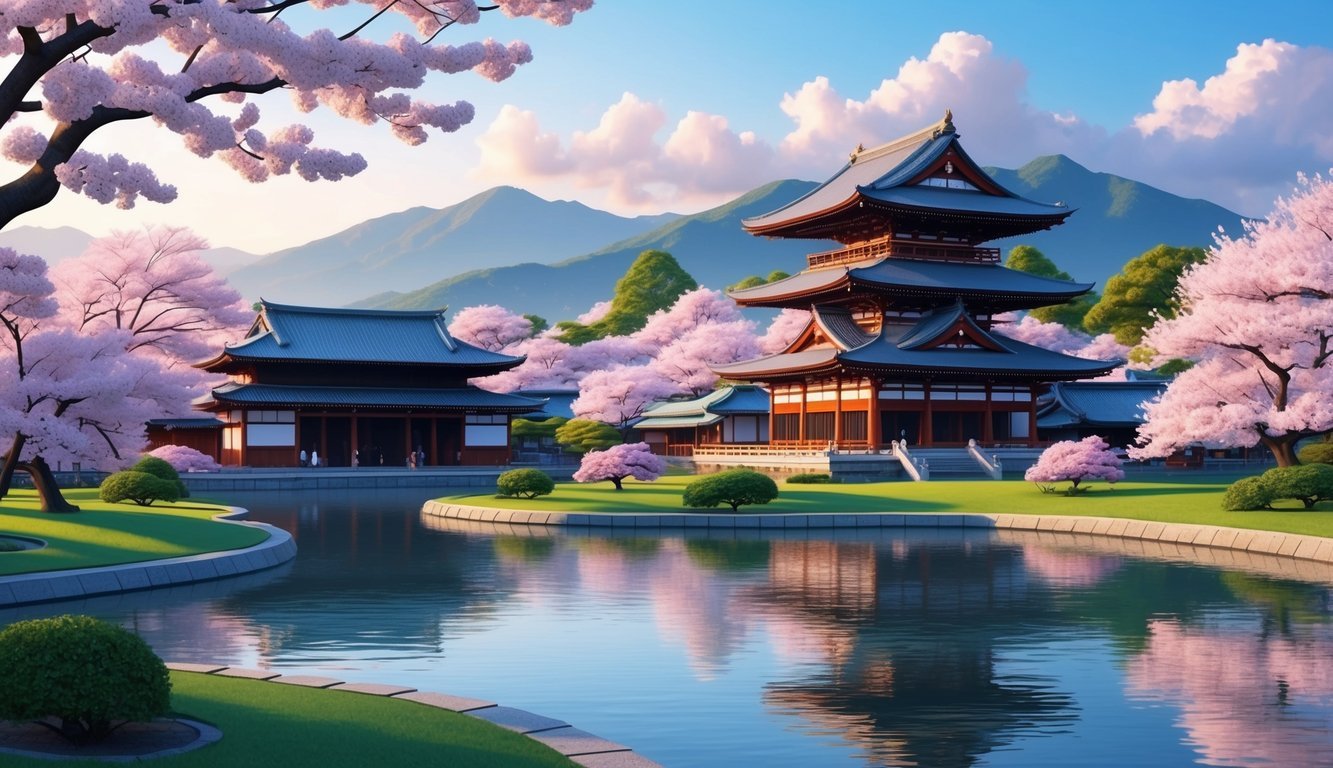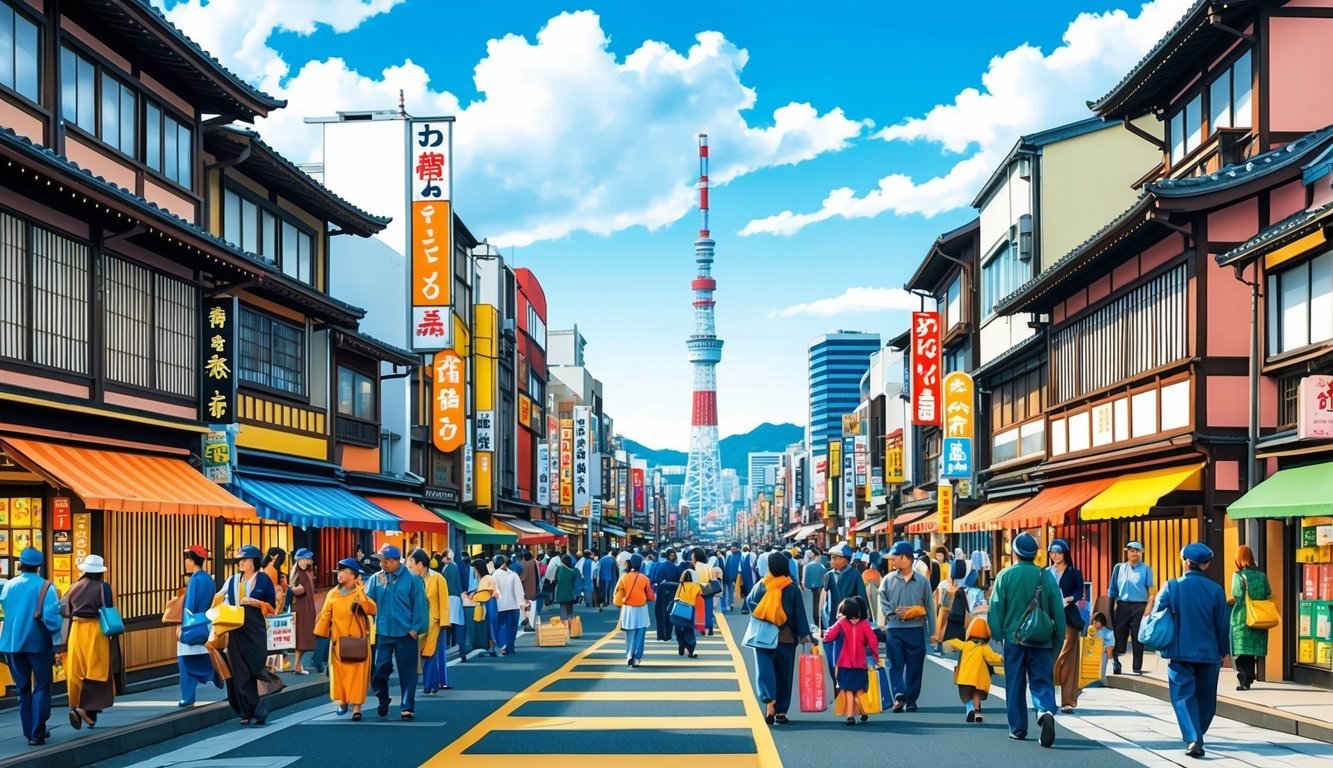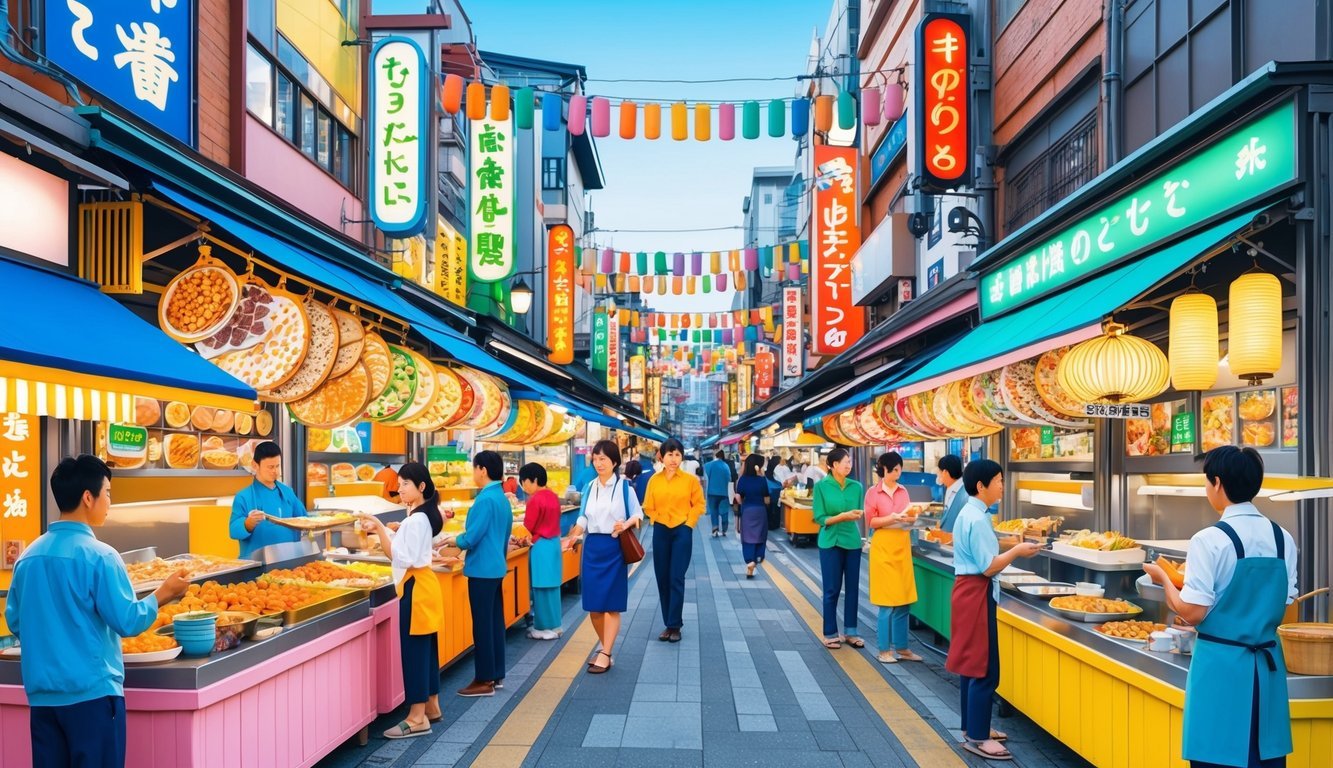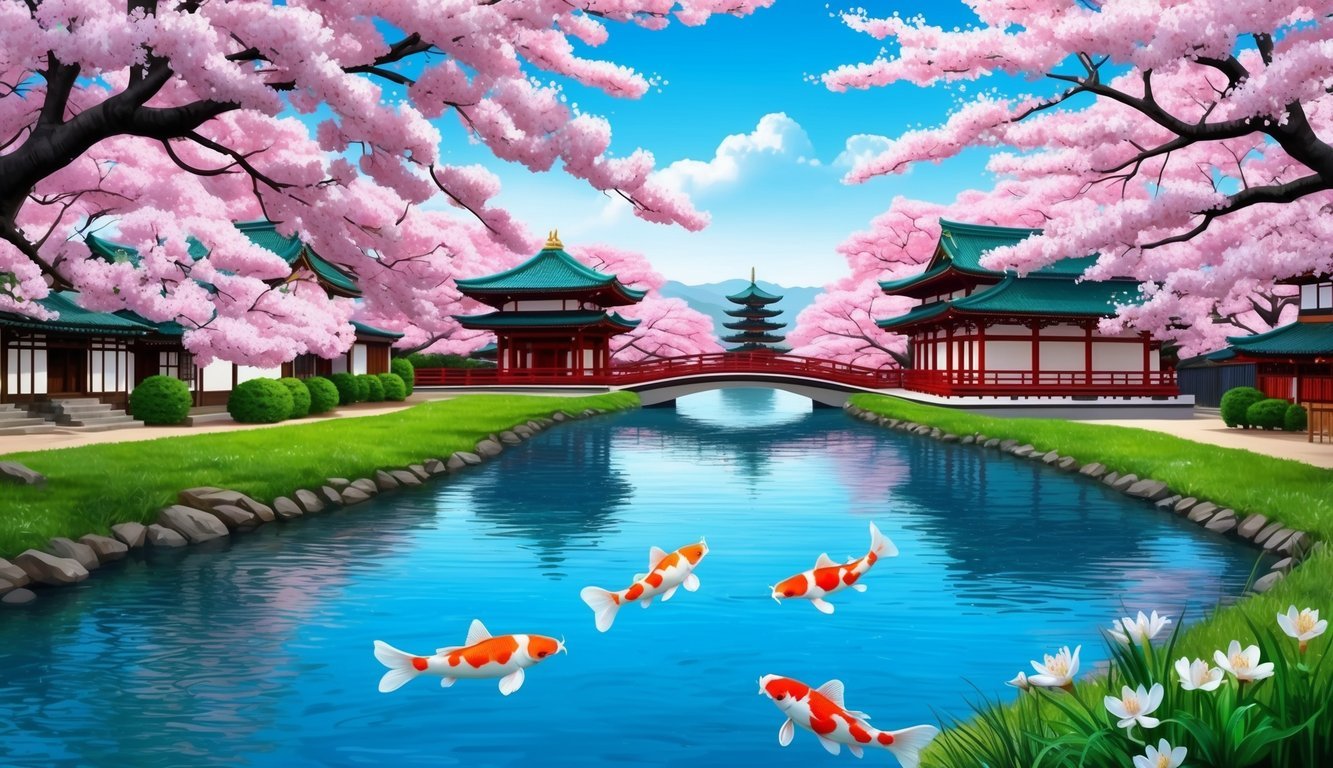Fukuoka, Japan, is a city that perfectly blends modern life with rich history and culture. Known as the gateway to Kyushu, Fukuoka offers a vibrant mix of attractions, delicious food, and friendly locals that make it a must-visit destination. Whether you’re wandering through its iconic districts or trying local specialties, you’ll quickly see why Fukuoka stands out.

The city boasts beautiful parks, fascinating museums, and a lively atmosphere that invites exploration. You can enjoy lively festivals, vibrant street markets, and a diverse art scene that showcases both traditional and contemporary works. There is much to discover, from historical sites to contemporary shopping experiences that highlight the best of Japanese culture.
Fukuoka’s location on the northern shore of Kyushu Island allows you to explore beautiful nature spots and nearby attractions with ease. This charming city promises an adventure that caters to all types of travelers, making it a perfect starting point for your journey in Japan.
Key Takeaways
- Fukuoka is a vibrant city rich in history and culture.
- It’s known as the gateway to Kyushu with diverse attractions.
- The city offers a great mix of nature, food, and local events.
History and Culture

Fukuoka is a city rich in history and culture, blending ancient traditions with modern influences. You’ll find fascinating stories and landmarks that highlight its unique journey through time.
Historical Timeline
Fukuoka’s history dates back over 2,000 years. Initially, the area served as a vital port for trade with China and Korea. The region’s historical significance grew as the city became known as Hakata during the Heian Period (794-1185).
In the late 16th century, Toyotomi Hideyoshi built a castle, marking Fukuoka as a strategic military site. Over the years, it evolved into an economic hub. The merging of Hakata and Fukuoka in 1889 solidified its status as a key city on the island of Kyushu.
Throughout the years, Fukuoka witnessed both prosperity and challenges, including natural disasters that shaped its resilience and character.
Cultural Heritage
Today, Fukuoka showcases a vibrant cultural heritage that includes festivals, temples, and unique traditions. The annual Hakata Gion Yamakasa festival is one of the most famous events, celebrated every July. It features beautiful floats carried through the streets, attracting visitors and locals alike.
Fukuoka is home to many historic sites, such as Munakata Taisha, a shrine with roots dating back to ancient times. The city’s temples, including Shofukuji, reflect the deep influence of Zen Buddhism, adding to its cultural richness.
You can also explore local crafts, art, and delicious cuisine that highlight the region’s heritage.
Merchant Town of Hakata
Hakata has long been a bustling merchant town. From the 8th century, it became a center for trade, receiving goods from across Asia. The docks of Hakata welcomed ships loaded with rice, textiles, and spices.
As a merchant town, Hakata developed notable customs such as unique cuisine, including Hakata ramen, known for its rich pork broth. You can experience local markets like Dazaifu, which offer traditional crafts and food.
The area still embraces its merchant roots, making it an exciting place to shop and taste local flavors.
Castle Town of Fukuoka
Fukuoka’s evolution into a castle town started with the construction of Fukuoka Castle in the 17th century. The castle was a stronghold during the Edo period and reflected the power of the ruling clan.
You can visit the remaining ruins and enjoy beautiful views of the city from the castle grounds. The surrounding area has park space that is perfect for leisurely strolls.
The castle’s history adds depth to Fukuoka’s character, reminding you of its strategic significance and the blend of natural beauty with rich cultural history.
Geography and Population

Fukuoka is located in northern Kyushu, Japan, along the southern coast of Hakata Bay. The city features a blend of urban areas, natural beauty, and nearby islands. Its layout and population reflect the dynamic culture and vibrant community you can explore during your visit.
City Layout
Fukuoka has a well-structured city layout that combines modern development with historical sites. The city center, known as Tenjin, is bustling with shops, restaurants, and entertainment options.
Nearby, you’ll find the area of Hakata, which is famous for its rich history and cultural landmarks.
The Itoshima Peninsula is to the west, offering scenic views and outdoor activities. The small island of Nokonoshima is just a short ferry ride away, known for its beautiful flower parks and beaches.
Population Density
Fukuoka is one of Japan’s most populated cities, with around 1.6 million residents. The city’s density contributes to its lively atmosphere.
Greater Fukuoka has a much larger population, consisting of about 2.5 million people in the surrounding areas.
As of 2024, the city’s growth rate is about -0.22%, indicating a slight decline. Despite this, Fukuoka remains an attractive destination due to its diverse culture, thriving economy, and friendly locals.
The mix of urban living with coastal access makes it an appealing spot for both residents and visitors.
Iconic Districts and Landmarks

Fukuoka is a city rich in culture and history, offering unique neighborhoods and famous landmarks. Each district has its own character and attractions, making them must-visit spots for anyone exploring the city.
Tenjin
Tenjin is the bustling heart of Fukuoka, famous for its shopping, dining, and entertainment. Here, you can explore large department stores like Tenjin Core and Parco, which feature both international and local brands.
Don’t miss the Tenjin Underground Shopping Mall, a vast network of shops and cafes. The area also boasts various eateries, serving up delicious local dishes. It’s a great spot to try some Hakata ramen.
At night, Tenjin transforms into a lively area filled with bars and clubs, making it perfect for those looking to experience Fukuoka’s nightlife.
Nakasu
Nakasu is known for its vibrant atmosphere and is often regarded as Fukuoka’s nightlife hub. This area features many yatai, or food stalls, where you can savor local delicacies while enjoying views of the Naka River.
Stroll along the river to soak in the sights, or head to one of the numerous izakayas for an authentic dining experience. Nakasu is also home to various entertainment venues, making it an exciting place to visit after dark.
Don’t forget to take a moment to appreciate the colorful neon lights that create a lively ambiance throughout the district.
Hakata Station Area
Hakata Station serves as the main transportation hub in Fukuoka. The station is not just a transit point but also a landmark in itself. Within its walls, you’ll find shopping complexes and restaurants that showcase the best of Fukuoka’s food culture.
Take time to visit the nearby Kushida-jinja Shrine, one of the oldest Shinto shrines in the area. It’s a peaceful spot to soak in some history amidst the bustling surroundings.
Hakata’s famous symbol, the giant bronze statue of a mythical dragon, is also a sight you don’t want to miss.
Fukuoka Tower and Ōhori Park
Fukuoka Tower is an iconic landmark that stands tall at 234 meters, making it Japan’s tallest seaside tower. Head to the observation deck for breathtaking views of the city and the surrounding bay.
Just a short walk away is Ōhori Park, known for its beautiful landscape and serene pond. This park is perfect for a leisurely stroll or a peaceful picnic.
You can also rent a paddleboat to explore the pond while enjoying the well-maintained paths and gardens. The combination of Fukuoka Tower’s views and the tranquility of Ōhori Park creates a unique experience you won’t forget.
Gastronomy

Fukuoka is a food lover’s paradise. The city is famous for its unique local dishes and vibrant street food culture. With a wide variety of flavors and ingredients, you’ll discover something delicious around every corner.
Local Dishes
When you visit Fukuoka, don’t miss trying Motsunabe, a hot pot dish made with beef or pork intestines simmered in a rich broth. It’s often topped with fresh vegetables and garlic, creating a hearty meal.
Another local favorite is Tonkotsu Ramen, known for its creamy pork bone broth. The noodles are thin and firm, perfect for slurping. You should also taste Mentaiko, spicy fermented cod roe, which is used in various dishes, including pasta and sushi.
For a lighter option, try Mizutaki, a chicken hot pot dish served with fresh vegetables. Enjoy these dishes with a side of Hitokuchi Gyoza, small, pan-fried dumplings filled with meat and vegetables.
Street Food Culture
Fukuoka’s street food scene is lively and diverse, especially around Yatai stalls. These mobile food vendors provide a casual dining experience. You can savor quick bites and enjoy the vibrant atmosphere.
Don’t miss out on fresh seafood served at some stalls. You might find grilled fish, oysters, or even sushi. Just point to what you want and enjoy your meal right on the street!
Yatai also offers the famous Hakata Ramen, distinct for its delicious flavor and quick service. Grab a bowl at night and experience the local vibes.
Ramen and Beyond
Ramen is the star of Fukuoka’s culinary scene. The city is known as the birthplace of Tonkotsu Ramen. Stop by any ramen shop to try a steaming bowl.
In addition to ramen, seafood lovers will appreciate local sushi options. Each bite showcases the fresh ingredients from the surrounding waters.
For a comforting meal, visit a Yatai stall for a bowl of Mizutaki. The combination of tender chicken and vegetables warms you up, especially on cooler nights.
Whether you’re grabbing a quick bite or dining out, the diverse flavors in Fukuoka will surely impress you!
Shopping and Entertainment
Fukuoka offers a vibrant mix of shopping and entertainment options. You can explore large shopping complexes, discover traditional crafts, and enjoy exciting nightlife.
Canal City Hakata
Canal City Hakata is one of Fukuoka’s top shopping and entertainment spots. This massive complex stretches over 1,000 meters and features over 250 stores. You can find everything from high-end brands to local shops.
As you stroll through, you’ll notice the beautiful canal that runs through the center. It’s not just about shopping; there are also restaurants, a theater, and even a game center. Don’t miss the daily water and light show, which adds a magical touch to your visit.
Traditional Crafts and Shopping
If you’re looking for unique souvenirs, Fukuoka is rich in traditional crafts. You can find beautiful pottery, textiles, and handmade items that showcase local talent. The Hakata district is famous for its Hakata dolls and textiles.
Many shops offer these traditional crafts, providing a glimpse into the region’s culture. You can also find kimonos and other clothing made from quality fabrics. Visiting these shops helps keep the local arts alive while giving you a special memento to take home.
Nightlife
When the sun sets, Fukuoka’s nightlife comes alive. You can explore the lively entertainment districts like Tenjin and Nakasu. Bars, izakayas, and nightclubs are scattered throughout, offering a range of atmospheres.
Enjoy a drink and try local dishes like yatai, which are food stalls serving tasty street food. Karaoke is also popular here, so grab some friends and sing your heart out. With vibrant lights and friendly locals, Fukuoka’s nightlife is sure to make your evening memorable.
Nature and Seasonal Highlights

Fukuoka offers a beautiful mix of parks and seasonal events that showcase the region’s natural beauty. From cherry blossoms in spring to vibrant autumn leaves, there’s something for everyone to enjoy throughout the year.
Parks and Green Spaces
Fukuoka is home to several stunning parks perfect for nature lovers. Ohori Park is a must-visit. It features a large pond and walking paths where you can relax and take in the views. The park is popular for jogging, picnicking, and enjoying cherry blossoms in the spring.
Another gem is Maizuru Park, which is famous for its historical ruins and vibrant seasonal foliage. You’ll find ginkgo and cherry trees lining the paths, providing a picturesque scene, especially during the fall.
Don’t forget about Uminonakamichi Seaside Park. It stretches over 300 hectares and boasts beautiful gardens and playgrounds. This park is ideal for families and offers fun activities like cycling, flower festivals, and beautiful flower displays throughout the year.
Seasonal Events
Fukuoka’s climate makes it a great spot for seasonal celebrations. In spring, the Hakata Hanami Festival draws crowds eager to see blooming cherry blossoms. Local parks become lively with picnics and parties under the petals.
As summer arrives, you can enjoy the Hakata Gion Yamakasa, a vibrant festival featuring stunning floats and traditional ceremonies. It’s a chance to experience local culture at its finest.
Autumn showcases stunning views of colorful leaves. Visit parks like Maizuru to see fiery reds and yellows as trees change with the season. Don’t miss the Miyamoto Pumpkin Festival, where you can enjoy fun activities and delicious seasonal treats.
Festivals and Events
Fukuoka is known for its lively festivals and events throughout the year. These celebrations showcase local culture, food, and community spirit, making them a must-see for visitors.
Hakata Dontaku Festival
The Hakata Dontaku Festival takes place every May during Japan’s Golden Week. With around 30,000 participants and over two million spectators, it is one of the largest festivals in Japan.
You can see vibrant parades featuring traditional costumes and lively music. The festival has a history dating back over 800 years, continuing to thrive through centuries. Food stalls line the streets, offering local delicacies and snacks.
If you’re in Fukuoka during this time, join the excitement and experience the energetic atmosphere. You’ll see performances and events all around the city, making it a truly unforgettable experience.
Other Celebrations
Fukuoka hosts various celebrations throughout the year. One beloved winter event is the Uminaka Candle Night in December. This stunning display of lanterns lights up the coastline, creating a magical winter wonderland.
Another annual highlight is the Yamakasa Festival in July. It features teams racing beautifully decorated floats through the streets at 4:59 AM, signaling the start of summer.
Throughout the year, you’ll find smaller events and seasonal festivals that celebrate the region’s rich culture. Whether you’re exploring food festivals or traditional events, there’s always something exciting happening in Fukuoka.
Arts and Museums
Fukuoka offers a rich selection of arts and museums that showcase its culture and creativity. You’ll find both traditional and contemporary art, as well as exhibitions that cater to all tastes.
Fukuoka Art Museum
The Fukuoka Art Museum is a must-visit for art lovers. Located in Ohori Park, it houses an impressive collection of modern and contemporary art.
You can explore works from notable Japanese artists alongside international pieces. The museum often hosts special exhibitions, so you might catch something unique during your visit.
Hours are from 9:30 a.m. to 5:30 p.m., with extended hours on Fridays and Saturdays during summer. For more details, visit their official website.
Fukuoka Asian Art Museum
Another gem in Fukuoka is the Fukuoka Asian Art Museum. This museum focuses on art from other Asian countries, housing around 4,000 pieces.
You’ll find various exhibits that highlight different cultures, artists, and styles. The collection changes regularly, giving you a fresh experience each time you go.
If you’re interested in pan-Asian art, this is the perfect place to immerse yourself. The museum also organizes events and workshops that encourage interaction with the art.
Contemporary Exhibitions
In Fukuoka, contemporary art plays a big role in the local scene. Regular exhibitions feature innovative works that often challenge traditional views.
Notable collaborations with groups like Teamlab bring immersive digital art experiences to life. Their installations often combine light, sound, and interactive elements, making you a part of the art.
Check local event listings to see what’s on during your visit, as contemporary art in Fukuoka is always evolving.
Travel and Transportation
Navigating Fukuoka is easy, thanks to its well-connected airport, public transit options, and quick access to neighboring regions. You can explore the city and beyond with minimal hassle.
Fukuoka Airport
Fukuoka Airport is super close to the city center, making your arrival smooth and quick. It takes about ten minutes by subway to get to the heart of Fukuoka.
The airport features both domestic and international flights, so you’ll find connections from major cities across Japan and direct flights to places like Busan in South Korea.
Upon arrival, you can take the Kuko subway line, or hop on a taxi or bus for convenient transport. Fukuoka Airport is user-friendly, with helpful signs in English and easy access to car rentals and shuttle services.
Public Transit
Getting around Fukuoka is a breeze. The city has a comprehensive public transit system including subways, buses, and trams.
The subway has two main lines that connect you to popular areas like Tenjin and Hakata.
You can also use the 100 Yen Bus, which offers a cost-effective way to explore the city for just 100 yen. Buses run frequently and cover many attractions.
Convenience stores and tourist info centers provide maps and schedules to help you navigate with ease.
Access to Neighboring Regions
Fukuoka serves as a perfect base to visit nearby cities like Kagoshima, Kumamoto, and Nagasaki. The train connections are quick and efficient, allowing you to travel effortlessly.
You can take the Shinkansen (bullet train) to Kagoshima in under two hours.
If you’re eager to explore South Korea, Hakata Port offers ferries to Busan, a great day trip option. Each journey opens up the chance to experience unique cultures, foods, and sights just a short ride away.
Surrounding Areas

Fukuoka is a great base for exploring nearby attractions. You can enjoy historical sites, beautiful beaches, and charming towns just a short trip away.
Day Trips and Excursions
One of the top spots near Fukuoka is Dazaifu Tenmangu. This famous shrine is dedicated to the deity of education, making it popular among students. You can admire the beautiful gardens and traditional architecture. It’s an easy trip, just about 30 minutes by train.
Another exciting destination is Kitakyushu, located about an hour away. This city offers a mix of modern and traditional attractions, including the Mojiko Retro District. Here, you can stroll along the waterfront and see beautiful old buildings. Don’t miss the Reclining Buddha at Nanzoin Temple, a large and impressive statue that’s worth visiting.
Beaches and Islands
When the weather’s nice, head to some nearby beaches. Just a short ride from Fukuoka, Nishi Beach is perfect for sunbathing or swimming. It’s popular with locals and visitors alike, so expect a relaxed vibe.
If you’re looking for a day on an island, consider visiting Shikanoshima. This island offers beaches, walking paths, and a chance to unwind. It’s accessible by ferry, making it an easy getaway. You can enjoy local seafood and take in stunning ocean views while you’re there.
Leisure and Lifestyle
Fukuoka offers a vibrant mix of recreation activities and wellness options that enhance your visit. From outdoor adventures to relaxation at hot springs, you’ll find plenty to enjoy.
Recreation Activities
In Fukuoka, you can explore various recreational activities that cater to all interests. You might want to take a stroll through the beautiful Maizuru Park, which features stunning cherry blossoms in spring.
If you enjoy being active, try biking along the riverside paths or participate in a game of beach volleyball at one of the city’s popular beaches like Nishitetsu.
For thrills, consider visiting the nearby mountainous areas for hiking. The stunning views are worth the climb.
Make sure to dive into the local food culture by trying dishes at outdoor yatai stalls. This unique experience combines food and leisure, allowing you to savor Fukuoka’s famous ramen and grilled skewers in a lively atmosphere.
Wellness and Spas
Fukuoka is also known for its relaxing wellness options, especially its hot springs. Kinosaki Onsen is a great spot where you can soak in natural mineral waters.
In addition, there are several day spas throughout the city that offer traditional Japanese treatments. These spas often include shiatsu massage and aromatherapy, perfect for unwinding after a long day of exploring.
You can also find wellness centers that focus on mindfulness activities, like yoga and meditation.
Don’t forget to enjoy some time in a traditional Japanese garden, where tranquility reigns. The calming environment allows you to recharge and connect with nature, rounding out your leisure experience.
Frequently Asked Questions
When planning your trip to Fukuoka, you might have some questions about the best times to visit, what to see, and the local foods to try. Here’s some information to help you make the most of your time in this vibrant city.
What’s the best time of year to visit Fukuoka?
The best times to visit Fukuoka are in spring (March to May) and fall (September to November). During these seasons, you’ll enjoy mild weather and beautiful scenery, especially during cherry blossom season and when the leaves change color.
Which attractions should I not miss when in Fukuoka?
Some must-see spots include Fukuoka Castle, Ohori Park, and the bustling Nakasu District. Don’t forget to check out the historic Kushida Shrine and the lively Canal City Hakata for shopping and entertainment.
What are some must-try foods in Fukuoka?
Fukuoka is famous for its Tonkotsu ramen, particularly at places like Ichiran Ramen. You should also try Hakata gyoza, mentaiko (spicy cod roe), and the delicious local street food found in yatai stalls.
How do I get around the city easily?
To get around Fukuoka, you can use the subway system, which is efficient and easy to navigate. Buses and bicycles are also great options. Taxis are available but can be more expensive than public transport.
Can you recommend cool spots for shopping in Fukuoka?
For shopping, visit Tenjin, where you’ll find a mix of department stores and boutiques. Canal City Hakata is also a popular destination, offering shopping, dining, and entertainment all in one place.
Are there any day trips from Fukuoka I should consider?
A day trip to Dazaifu Tenmangu is a good option. This historic shrine is in a beautiful setting. You can also visit Yanagawa, known for its scenic canals. Or, you can explore the hot springs in Beppu for a relaxing experience.

